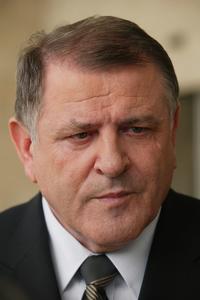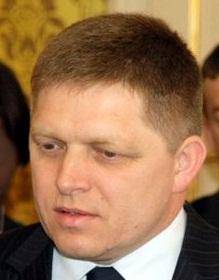 W
WParliamentary elections were held in Slovakia on 18 December 1938 following the German occupation of Czechoslovakia.
 W
WParliamentary elections were held in Slovakia on 14 June 1964, alongside national elections. All 92 seats in the National Council were won by the National Front.
 W
WParliamentary elections were held in Slovakia on 8 and 9 June 1990 alongside federal elections. They were the first elections after the Velvet Revolution, and the first free elections since 1946. The Public Against Violence (VPN) party emerged as the largest in the Slovak National Council, winning 48 of the 150 seats. In the aftermath of the election, Vladimír Mečiar of the VPN formed a grand coalition with the Christian Democratic Movement (KDH). After a conflict leading to the dissolution of the VPN, the first Mečiar cabinet was brought down by a vote of non-confidence in the parliament. Ján Čarnogurský of the KDH became the new Prime Minister in April 1991.
 W
WParliamentary elections were held in Slovakia on 5 and 6 June 1992 alongside federal elections. The Movement for a Democratic Slovakia emerged as the largest party, winning 74 of the 150 seats in the National Council and forming a minority government under Vladimír Mečiar. The threshold had been raised from 3% to 5%.
 W
WParliamentary elections were held in Slovakia on 30 September and 1 October 1994. The early elections were necessary after the Vladimír Mečiar 1992 government had been recalled in March 1994 by the National Council and a new temporary government under Jozef Moravčík had been created at the same time.
 W
WParliamentary elections were held in Slovakia on 25 and 26 September 1998. The elections resulted in the defeat of the Vladimír Mečiar government and the election of Mikuláš Dzurinda as Prime Minister. His party, the Slovak Democratic Coalition formed a coalition government with the Party of the Democratic Left, Party of the Hungarian Coalition, and the Party of Civic Understanding.
 W
WParliamentary elections were held in Slovakia on 20 and 21 September 2002. The People's Party – Movement for a Democratic Slovakia remained the largest party in the National Council, winning 36 of the 150 seats. Mikuláš Dzurinda of the Slovak Democratic and Christian Union remained Prime Minister, in coalition with the Party of the Hungarian Coalition, Christian Democratic Movement, and Alliance of the New Citizen parties.
 W
WParliamentary elections were held in Slovakia on 17 June 2006. Direction – Social Democracy emerged as the largest party in the National Council, winning 50 of the 150 seats. Its leader Robert Fico was appointed Prime Minister on 4 July 2006, leading a three-party centre-left populist coalition.
 W
WParliamentary elections were held in Slovakia on 10 March 2012 to elect the 150 members of the National Council. The elections followed the fall of Prime Minister Iveta Radičová's Slovak Democratic and Christian Union – Democratic Party-led coalition in October 2011 over a no confidence vote her government had lost because of its support for the European Financial Stability Fund. Amidst a major corruption scandal involving local center-right politicians, former Prime Minister Robert Fico's Direction – Social Democracy won an absolute majority of seats.
 W
WParliamentary elections were held in Slovakia on 5 March 2016 to elect the 150 members of the National Council. The ruling left-wing populist Direction – Social Democracy (SMER–SD) party remained the strongest party, but lost its majority. The Slovak Democratic and Christian Union – Democratic Party (SDKÚ-DS), which led the government between 2000–06 and 2010–12, was defeated heavily, failing to cross the electoral threshold and losing its representation in the National Council. The centre-right Christian Democratic Movement (KDH) also failed to cross the threshold for the first time since 1990, whilst the far-right nationalist Kotleba – People's Party Our Slovakia (ĽSNS) entered parliament for the first time.
 W
WParliamentary elections were held in Slovakia on 29 February 2020. All 150 members of the National Council were elected and the leader of the resultant government party or coalition will become the Prime Minister.
 W
WA parliamentary election took place in Slovakia on 12 June 2010. The elections were contested by eighteen parties, six of which passed the 5% threshold for sitting in parliament. Despite the incumbent Smer of Prime Minister Robert Fico winning a plurality, the new government consisted of a coalition led by the Slovak Democratic and Christian Union – Democratic Party's Iveta Radičová and included KDH, SaS and Most-Hid. However, her government fell on 11 October 2011 following a vote of no confidence with a new election called for 10 March 2012.